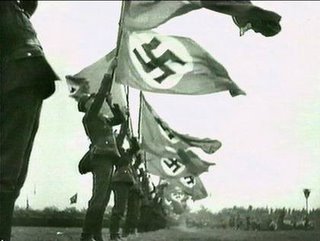
Due to the new technologies of film editing and the new science of psychology, the Nazis were able to produce films that made the audience think what the Nazis wanted them to think. “And the Nazis themselves knew quite well that life photographed is not necessarily synonymous with the image of life” (Kracauer 298). The propaganda of the Nazis, specifically having a Propaganda Ministry as noted in the Kracauer text, was to make a reality that showed the Nazis in a good light and that the war effort was good. The movie Triumph of the Will was the perfect movie for this intention. Hitler himself said that the film was an "incomparable glorification of the power and beauty of our Movement” (IMDB). The Nazis used actual Newsreel footage and not studio recreations. Tight editing cut out actual fighting. The Nazis showed the objective, then showed the accomplishment, skipping the take over part, essentially having the “resistance [disappear] in the ‘pockets’ of the commentary” (Kracauer 278). They used real images that made them look good. Music is also used to supplant images. “Music, and music alone, transforms an English tank into a toy” (280).
Goebbels himself “said that films must address people of all strata” (277). In this regard, the films were inescapable and ubiquitous to the Germans at this time. The people of all walks of life were inundated with so much specifically-made propaganda that one couldn’t help but fall into it. It is this type of filmmaking and governmental hypnotism that famous novels like 1984 were written to warn of these behaviors. Those people that think the book is science fiction should understand that the book takes only one liberty—that of a government, like that of Germany in the 1930s and 1940s, and extrapolated it to the future.
The film Triumph of the Will uses many tricks, through both film media and psychology to push its agenda. Watching this film made me immediately think of the relatively new film Fahrenheit 9/11. One of the differences in ideology between these two films is that in our twenty-first century world, other viewers (newspapers, audiences, and critics) can offer up alternative points of view. In Nazi Germany in 1935, nobody could get away from this film or offer up an alternate view, especially as IMDB.com says that Triumph of the Will was actually made to replace an earlier film that was destroyed because a man in it supposedly plotted against Hitler, thus prompting the Nazis to completely erase him from history.
Psychological tricks include simple phrases of logic that cannot be refuted. For instance, when Otto Dietrich says, “Our only demand of the foreign press and our own press, is that they report the truth about Germany,” one cannot argue against that. But when Germany controls the press, the trust factor shouldn’t be mitigated. These speeches, when taken in the context of 1935, tried to unify a Germany that was falling apart with national pride. Showing babies is reminiscent of politicians kissing babies.
All in all, this film “feels” good. There is music and parades. The quick cuts and editing make it seem a collage, something that you can see but not put a finger on. When you compare it to the Rose Parade, with nifty patriotic messages, it looks pretty good.
IMDB.com.Triumph of the Will. http://www.imdb.com/title/tt0025913/
No comments:
Post a Comment